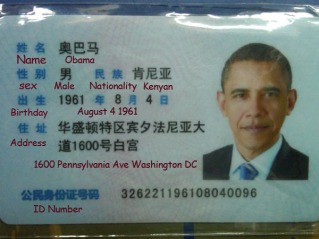
Homeless tunnel docile
Foreign travelers fluent in Chinese and those that are not both find that getting accommodations in China is among the most difficult of tasks in this country. Each city has hundreds of hotels, hostels, and inns, some of which are extremely cheap and most convenient; however, as a foreigner, you are only allowed to stay in a select/limited number of them (and these can be the more expensive, less convenient choices). Hotels in China are required to meet certain criteria before they receive accreditation from the authorities to welcome foreign guests (外宾 wài bīn). Not only is the law bad for business, it is discriminatory and arbitrary in nature!
This regulation is so arbitrary, it has travelers from Taiwan and Hong Kong even confused as to what it means. The phrase “可否接待外宾的酒店” means “can/cannot receive foreign guests at this hotel” is a phrase you will want to check for when using the hotel’s booking services online (mind you, only a few hotels mention this upfront). Let us take a look at some basic criteria for the law:
- To become a hotel for foreigners is a serious matter, requiring application by the hotel’s company to the Public Security Department; however, the hotel needs the right equipment provided to guests. Hardware such as international calling service, international television channels, Chinese/English menus, Chinese/English signs, etc. and software such as staff that speak both Chinese and English, hold a bachelor’s degree, and are capable of welcoming foreign guests, are all required.
- If a hotel does not meet these requirements, they can only serve domestic guests. In this case, there is no need for the hotel to provide the above provisions.
- The hotels registries are regularly sent to the Public Security to the departments that check all registries; if a foreign guest is found having stayed at a domestic hotel, the hotel will receive punishment. This is because it is illegal for foreign guests to stay at the domestic hotels.
(Some speculate that the issuing of approval from the Public Security Department to the hotels is more based on building safety, cleanliness, clearance of access, fire safety, etc. It is likely to be a mix of these rules and building code.)
How is this discriminatory/arbitrary in nature?

Obama’s Chinese ID!
Much of what is required by law seems to be positive. The law pushes businesses to meet the demands of the international community (largely forcing students to learn English to enter the work force and to increase China’s service standards); however, what if a foreigner can speak Chinese and doesn’t require English-speaking staff or food menus in English? Too bad, because the hotel cannot enter your passport into the registry or else the Public Security will punish the business. Without a Chinese ID number, you will be promptly rejected, even if you booked online days in advance. (An awkward situation because the staff knows you speak Mandarin, yet the reason they must reject you is because they can’t communicate with a foreigner using English).
Furthermore, hotels that do permit foreign guests sometimes do not fully meet the requirements as stated above. This is either because they have received approval due to corruption or they blatantly break the law. There is also the possibility that gaps exist in the issuing of these “foreign guest licenses” where the issuing department did not do a thorough job at checking the hotel’s qualifications (blanket approvals). What is most perplexing is how some of China’s largest chain hotels such as 七天酒店 (qī tiān jiǔ diàn 7 Days Hotel) and 如家酒店 (rú jiā jiǔ diàn Home Inn) vary on approval–there could be two Home Inns on opposite sides of the street from each other, one allows foreign travelers and the other might not! Who in the world knows why, even they can’t explain it!
Solution
Even if you are a “global adventurer” and like to follow the unbeaten path, it is very difficult to do so in China. You are safer booking a bed at an international hostel or a room at a hotel designed for foreigners. The other alternative is to travel with local friends that can use their Chinese ID to book the room on your behalf. It just isn’t worth the gamble of booking days in advance, arriving late at night to the hotel, and then being rejected when all the other hotels in the city are already booked (speaking from personal experience). Try begging, but most hotel managers today are aware of the harsh punishments associated with breaking this law and will not budge. If you are lucky, the boss will be gone that day and the employee at the counter will be ignorant to the regulation.
Although the Chinese government’s intentions are good, with the aim of raising standards, they are unaware of the deeply negative consequences they have caused to foreign travelers within the country and to businesses that must turn away guests. Let’s hope they change this soon, and please take my advice because you may end up with nowhere to stay in an unfamiliar city, sleeping in a tunnel with all the homeless.


Oh yeah the hotel trouble…
I just faced it yesterday again, ok it was also our fault but still. As my in laws got some connections they arranged for us to stay at a military hotel near their place. Everything was fine except the person arranging it for us forgot to tell the rest of the staff that my father and I are foreigners :p
Anyways we got a hotel just ten meters away in the end and I stay with the in laws
LikeLike
Lots of fun to deal with haha. Luckiky, there are just loads of hotels everywhere in lots of places. Glad it all worked out!
LikeLiked by 1 person
the real reason why the Chinese Communist Government has imposed such restrictions has little to do with service standards. The real reason is far more nefarious.
LikeLike
Okay, would you like to enlighten me?
LikeLike
Any foreigner living in the PRC is considered a spy and must be watched. So foreigners are segregated in certain neighbourhoods and can only stay in certain hotels etc… China is Police State need more explanation?
LikeLiked by 1 person
I should add that I lived in Beijing for 3 years and am well versed in Officialdom of the PRC.
LikeLiked by 1 person
You could be right, but I think that is more of a Cold War era way of thinking. Even China is quite globalistic. Perhaps in Beijing, the government has a closer eye on foreigners since it is the center of politics. In much of the rest of the country, this may be far less the case.
LikeLike
Also, I think you have a lot more to worey about as a citizen of China than as a foreigner living in China; Beijing cares far more about what their own citizens are up to than what foreigners are up to. That is why the discussion of this article is about the discriminatory nature of these policies. While China continues to glovalize, they need to make the country more convenient for foreign travelers.
LikeLike
Enjoyed reading this…love reading interesting things about China.
LikeLike
Thank you! I am the same way as you!
LikeLiked by 1 person
I’ve never had a problem with this in 8 years in China, but I always plan ahead and book in advance!
For foreigners who can’t speak Chinese, the English version of Ctrip or websites like Agoda or Booking won’t show hotels that can’t lodge foreigners. For foreigners who speak Chinese, the Chinese version of Ctrip indicates if they are only for 内宾.
LikeLiked by 1 person
I am not aware if Ctrip requires hotels to indicate whether they accept foreign guests or not, but using the English versions will likely render better results for foreigners. I was turned down multiple times when traveling in China. I didn’t always book ahead, under the assumption that it didn’t matter.
LikeLike
Afterall, coming from a place where if you turned somebody down because they were a foreigner, it would reach international headlines and the business owner would be called a rascist/biggot/whatever, it deffinitely isn’t something a person would be expecting.
LikeLike
Yes, I agree with that. But I think it’s getting better. Before, foreigners could only stay in the Friendship hotel, right? Now we can stay in most places, except the super cheap ones (this is based on what I’ve seen in Ctrip, the “only for Chinese” was always in very cheap places, like 农家乐 even).
But, on the other side, just yesterday, there was an article about a comic released by the government warning Chinese women that their foreign boyfriends might be spies! Did you see it?
LikeLiked by 1 person
I read the article and the cartoon. It doesn’t claim that all foreigners are spies, it is talking about a specific example of a “handsome foreigner spy” that is dating a female government official that has access to classified documents and retrieves them for him. For one, I think women could in some ways feel offended by the assumption that females are easy targets to deception, thats besides the point. I think the comic is talking about a specific situation, rather than “watch out, all foreigners are spies!” (paranoia, Red Scare) campaign that some presume about China.
LikeLike
I just think it’s weird that a situation that must extremely uncommon (foreign spy managing to extract country secrets from a government official) is done in a comic and hang in public places like the subway in Beijing, like if it could happen to anyone!
LikeLiked by 1 person
Nice Post. I was not aware of this
LikeLiked by 1 person
I haven’t personally experienced this myself even after living in China for over 2 years (Of course the majority of the time I’ve had my own apartment and that’s probably why) but I have stayed at a handful of hotels, definitely cheap ones, and never had a problem with my passport not going through. Although, I have heard stories of it. Perhaps it depends on the city as well. Either way, I think these kind of restrictions are absolutely pointless and just makes traveling more inconvenient for foreigners in China. However, I look at it as one of those cons of China, where the pros still significantly outweigh the cons 🙂
LikeLike
Ridiculous how Barack Obama’s “Chinese ID” labels him as a Kenyan citizen.
LikeLike